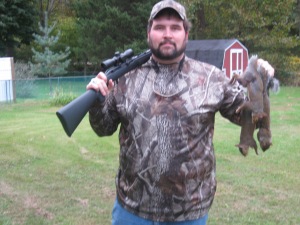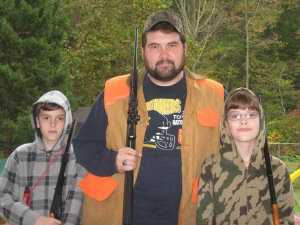Monday, May 16, 2011
Our New Chicken Coop
Wednesday, April 27, 2011
Turkey Season in West Virginia
 Spring Turkey Season opened in West Virginia on April 25, 2011. The first morning, I got to my spot before dawn and called in a couple of gobblers within the first hour. The first stayed out of range. The second saw me raise my shotgun and then took off. I did not leave empty handed, however, as I stumbled upon a handful of mollymoochers on my way out of the woods.
Spring Turkey Season opened in West Virginia on April 25, 2011. The first morning, I got to my spot before dawn and called in a couple of gobblers within the first hour. The first stayed out of range. The second saw me raise my shotgun and then took off. I did not leave empty handed, however, as I stumbled upon a handful of mollymoochers on my way out of the woods. Friday, August 20, 2010
Some Early Thoughts on the Possibility of a Reformed Seminary in West Virginia
The State of Reformed Theology in the State of West Virginia
I know there are 10 churches affiliated with the Presbyterian Church in America (my denomination). There are two Orthodox Presbyterian churches. One Evangelical Presbyterian church. One Reformed Baptist Church. Perhaps three or four independent Baptist churches that have Reformed leanings, but do not claim to be creedally Reformed. There are dozens of churches affiliated with the Presbyterian Church in the United States of America, but who knows how many of these are actually Reformed or even embrace the most basic Christian doctrines. So the State of West Virginia has a very meager Reformed presence. Why?
- It is difficult to find pastors for Reformed Churches in our State.
- It is hard to bring them in from the outside because there is a dearth of Calls within the State. Even when Calls are available, West Virginia doesn’t tend to attract people easily. There are not a lot of churches and not a lot of ministers for those churches. Five of our ten PCA churches are without pastors at the moment, so they are being filled by “stated supply,” which is a sort of interim. The vast majority of the dozens of PCUSA churches in the State are filled by lay-pastors, interims, and stated supply. This is probably because they are too small to support full-time, ordained teaching elders.
- It is hard to bring them in from the outside because most of those churches are not able to support full-time pastors. Low salaries do not attract pastors who need to support families.
- It is hard to bring them up from the inside because educational standards are poor within the State. West Virginia trails the nation in the percentage of college graduates. People who do not go to college cannot go to seminary. Someone who “desires the office of a bishop” has a long row to hoe before he can even begin to consider pastoring a church—at least 7 to 10 years of undergraduate and graduate education. Who wants to bother with this? It is a tough and rare achievement even in States with higher rates of college completion. How much more in a State where college degrees are few and far between.
- It is also hard to bring them up from the inside simply because Reformed theology is not widely understood even in Reformed churches. That leads to the second observation.
- West Virginians have a hard time accepting Reformed Theology and Presbyterianism. Why? I am not dogmatic, but I wonder if the following has any merit:
- Our Appalachian culture has been dominated by easier theology. Frankly, we are flooded with free-will theology, churches, and culture. Baptistic churches have spread throughout our State in part because there are no universal ordination standards, such as seminary education, and because baptistic theology is easier to both preach and digest. "Low ordination standards" means that literally anyone can be a preacher and a pastor. Baptistic churches can and have spread quickly and easily. It also means that their preachers and pastors tend to be unschooled in theology and exegesis. In many cases, West Virginia preaching is simplistic, containing very little theological instruction or exegesis. People have been digesting this type of preaching for decades. It is all they know. Bring in something different and people immediately recognize it. And that is not a good thing in their eyes. They may be getting the Word of God more richly and deeply than they ever have before, but they will still yearn for "hard preaching" and a some good ol' fire and brimstone. Can I get an "Amen?"
- The result is that Reformed theology is an affront to widely accepted and deeply pervasive free-will theology. Election is a bad word, as is the word "doctrine." The local Christian bookstore owner assured me that her Sunday School Quarterlies don't contain "doctrine." She said that as if it were a good thing, revealing at the same time that she was unaware of what the word "doctrine" even means. Even in Presbyterian churches, many congregants are suspicious of Reformed doctrines that have been taught elsewhere for centuries.
- There might also exist a blue-collar distrust for white-collar Presbyterian ministers. This is compounded by the simple fact that any serious attempt to teach theology must include terminology and complexities that many see no practical need for or have a difficult time understanding. The education and experience of those who labor in the Word varies so widely from those who labor with their hands that it is qualitatively different in comparison. This difference is not always viewed favorably.
- I also do not want to underestimate the dark and difficult history of West Virginia. Our history flavors who we are as West Virginians. I would even speculate that the deeply ingrained historical animosity between Company men and miners might play some sort of a role in the entire culture. Sometimes I wonder if the Presbyterian distinctions between ordained ministers and laymen might mirror the Company/miner distinction in disadvantageous ways. Is overarching presbytery action inherently perceived as analogous to Company dictates and abuses of power? This is union country. The Presbytery, by analogy, might be the Company. Union members are raised to distrust the company from their earliest years.
In short, our more complex theology and higher ordination requirements, among other cultural distinctives, might be responsible for reformed theology's lack of success in this State. But it does not seem that a simpler theology and lower education requirements would fix this problem. A simpler theology would be less likely to be a Reformed theology. Similarly, lower education requirements would eventually result in a simpler theology and less Reformed theology. One of the reasons we have such high education requirements is because it enables the preservation of the Reformed faith.
Monday, July 12, 2010
We are Finally Number One: A Different Take on Robert Byrd’s Legacy

Senator Robert Byrd, the longest-serving senator in United States history, passed away on June 28, 2010. As a West Virginian, I greatly appreciate the love and respect that he had for our State. But I question whether he has really accomplished what so many have been celebrating upon his passing.
In our local Sunday paper, the public statements of prominent citizens all repeated the same themes: Robert Byrd loved, studied, supported, and protected the constitutional role of the United States Senate, and Robert Byrd loved West Virginia with all his heart. He wrote a multi-volume history of the Senate and always carried a copy of the constitution in his coat pocket. Across the State, at least thirty roads, bridges, buildings, and programs bear his name, representing billions of federal dollars that he has funneled into our State. His affection for and dedication to Senate and the State of West Virginia cannot be questioned.
And yet, at the same time, a constant barrage of statistics throughout his tenure have told us that West Virginia still leads dozens of bad lists and is at the bottom of dozens of good lists, to our great and constant embarrassment. According to Bryan Bolduc of the Wall Street Journal (“Robert Byrd’s Highways to Nowhere,” July 10, 2010), West Virginia ranks 48th in both median household and per capita income. Over fifty percent of the state’s economy “relies on spending by local, state and federal government—the highest level of any state,” and “West Virginia ranked dead last among the 50 states in the Fraser Institute's Index of Economic Freedom of North America.” All statistics aside, West Virginia has a national reputation of being one of the most poverty stricken and economically backward states in the nation.
Of course, Robert Byrd is not the cause of all these problems. The causes are complex and stretch back through nearly 150 years of statehood. However, in spite of the fact that we have had the longest serving senator in U.S. history, elected again and again by the people of West Virginia, we still have not risen above the bottom in dozens of social, educational, health, and economic categories during his tenure.
Some will argue that since Robert Byrd was a federal senator, he was not responsible for improving conditions on the State and local level. And yet, these are the same people that celebrate the billions of dollars of federally funded projects that they claim are his legacy. Regardless of what Byrd has done for this state, the question remains-- has his federally funded legacy in any way mitigated our endemic problems? Some might say that had Robert Byrd not been our senator for the last 50 years West Virginia might be worse off than what it is. I simply respond that it is harder to get worse off than the bottom.
So, while Robert Byrd is not responsible for our State’s problems, he appears to have done little to alleviate them. Yet, we have elected him again and again and again. And for what? For his constant flag-waving in the name of West Virginia? For his having authored a multi-volume history of the Senate? For his genteel, old-school statesmanship? I doubt the average West Virginian has been motivated to put him back in office for any of these most nationally recognized characteristics. No. West Virginians repeatedly re-elected him for two reasons—1) because he funneled billions of federal funds into dozens of pork projects throughout the state, leading to the perception that he has accomplished something lasting on our behalf, and 2) because he has a reputation for using his political heft to help West Virginians in bad situations. For instance, one person who was repeatedly refused black lung benefits asked for Robert Byrd’s help. Those benefits came through almost immediately with apologies. Every West Virginian knows someone who knows someone who received similar aid from Senator Byrd. And West Virginians have loved him for it, enough to vote him into office for over 50 years.
Of course, Robert Byrd is to be commended for these noble interventions. One cannot help but respect his political clout and willingness to help individuals who needed help. Frankly, however, these anecdotes simply serve to remind us that, though he was a federal senator, Robert Byrd did indeed have great power on the State and local level, and West Virginia remains at the bottom of good lists and at the top of bad ones nonetheless.
What then are we to make of West Virginia’s loyalty to this politician who has not significantly changed our State for the better in spite of 50 years of power? What exactly have we been celebrating upon his passing? Perhaps it is mainly that, finally, we West Virginians have something to be proud of, trivial though it may be. We can now claim to have had the longest serving senator in the history of the United States of America. That was us. No one else. We did it, over and over and over again. We’re number one.
Yea.
Monday, July 5, 2010
West Virginians Have Been Told it is Raining

The Great State of West Virginia remains at or near the top of nearly every bad list and at the bottom of every good list of social, economic, educational, and health statistics. For example--
- Third highest tax burden per citizen in the nation.
- Third last in median household income and fourth last in personal income per capita.
- Fifth from the top in percentage of people who live below the poverty level.
- Fourth highest high school dropout rate.
- Dead last in percentage of college degrees; third last in graduate degrees.
- Fourth in the percentage of mobile homes.
- Highest rate of children who live with their grandparents.
- Diabetes rate leads the nation, along with high blood pressure rate, cholesterol rate, and loss of natural teeth.
- Fourth lowest birth rate.
- Fifth highest cancer death rate.
- Highest obesity rate.
- Highest percentage of smokers and users of smokeless tobacco.
- First in percentage of people living with a disability.
And yet, West Virginians have overwhelmingly re-elected the same ideology to political office for decades on the national and state level. Speaking of lists, is there one for the greatest percentage of people who have been repeatedly bamboozled, and are happy about it? What do we get for our blind allegiance? Do we really prefer the crumbs of federally-funded bridges, roads, buildings, and programs over real and radical improvement to the state of the State? Honestly, I don't care who they are or what party they are from, can we get someone--anyone--who can do something--anything--to actually make a difference within, oh let's say 50 years or so? Fifty years should be enough time to make a difference. Right?
Whoops! Maybe not.
Source: http://www.statemaster.com/state/WV-west-virginia
See also: http://online.wsj.com/article/SB10001424052748704111704575354870221777334.html
Tuesday, October 13, 2009
Thursday, July 2, 2009
Fishing Paint Creek
 Paint Creek is located south of Charleston off S.R. 61. In the summer and fall, sportsmen can catch trout, redeye or rock bass, bluegill and smallmouth bass. Most of the fish are panfish size, but that just means they fit the frying pan nicely. Trout can average about 12-15 inches. Smallmouths can be 10-12 inches. Redeye grow up to 10 inches but fight fiercely. The best artificial baits at this time of the year are usually small spinners like Joe's Flies, Rooster Tails, Mepps and Panther Martins. Paint Creek can be waded all along the way. Keep an eye out for copperheads on the banks.
Paint Creek is located south of Charleston off S.R. 61. In the summer and fall, sportsmen can catch trout, redeye or rock bass, bluegill and smallmouth bass. Most of the fish are panfish size, but that just means they fit the frying pan nicely. Trout can average about 12-15 inches. Smallmouths can be 10-12 inches. Redeye grow up to 10 inches but fight fiercely. The best artificial baits at this time of the year are usually small spinners like Joe's Flies, Rooster Tails, Mepps and Panther Martins. Paint Creek can be waded all along the way. Keep an eye out for copperheads on the banks.
Rainbow trout are stocked (March through May), but brown trout are native year around. These were caught July 1 along with a nice mess of redeyes and smallmouths.
Wednesday, April 1, 2009
Fire Under the WV Hills
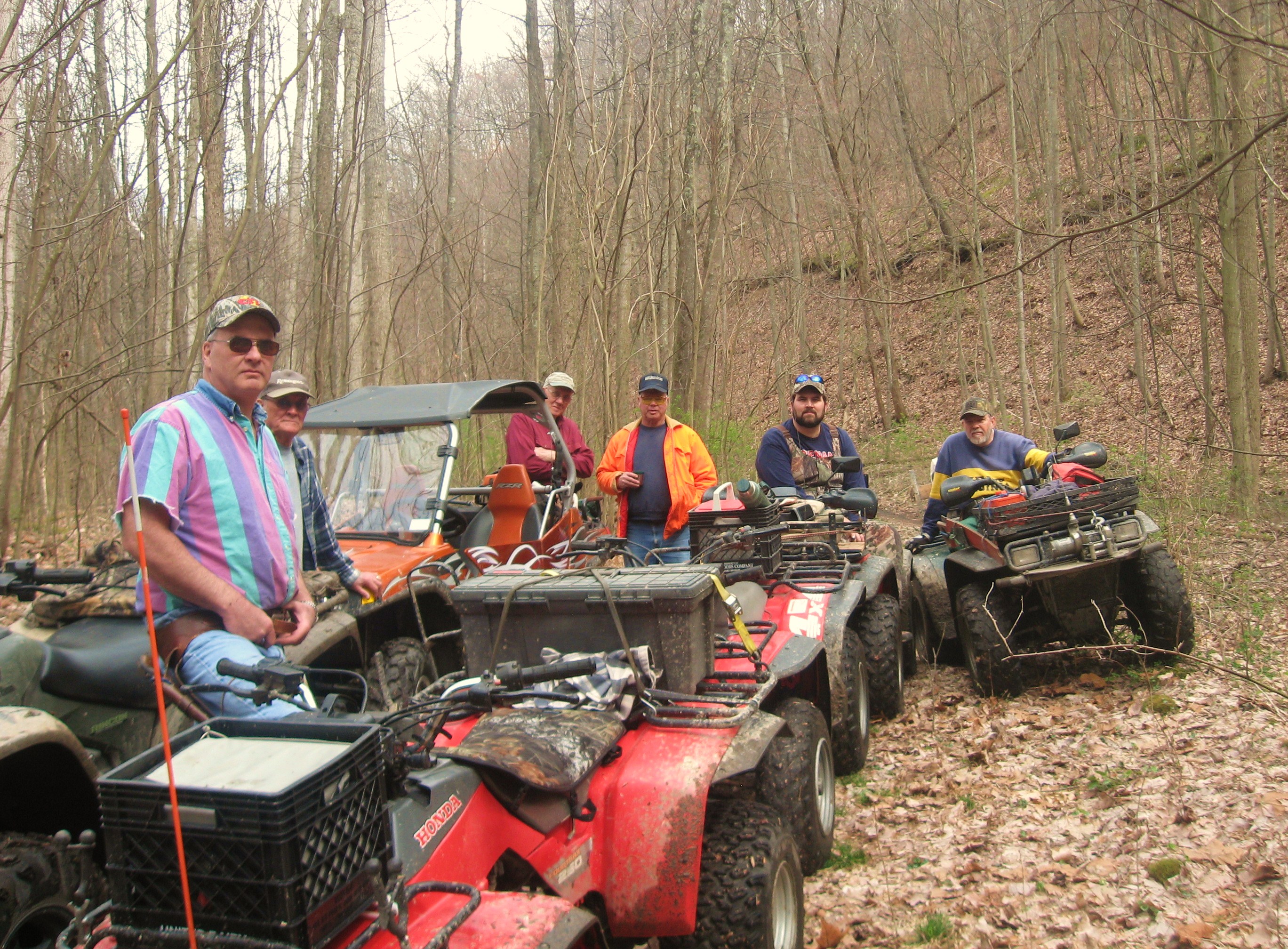
On Tuesday, I and some friends from in and around Winifrede WV drove over 30 miles of trails on our four wheelers (I am still having to borrow one, but am hoping to buy my own in the near future). The trails are left over from when the mountain tops were strip-mined in decades past. The fact that they have grown back up into fully-wooded, peaceful, wild-life inhabited hills is a testimony to the fact that coal mining and the beauty of WV ecosystems can coexist. We borrow from them for a time to make a living, but eventually, they return to their former beauty. Regardless, the land is here for us, and not we for it. Lives and a living come first.
We drove through the brush, cutting trees that had fallen across the trail, avoiding some mud holes, plowing through others, climbing in and over fearsome holes and rises in the path. Some of the obstacles looked to my inexperienced eyes to be unpassable. But with the encouragement and example of my friends, I have discovered there is very little that a four-wheeler cannot overcome. A little more experience and my fear of those obstacles will hopefully turn into the pure thrill of conquering a challenge tempered by healthy respect.
After 24 miles of trails, we stopped underneath a remote cliff face. I was amazed to see smoke seeping from gaping crevices in the rocks, welling up from deep underground, miles away from any civilization. My companions explained that under our feet was a coal mine, abandoned long ago, that had been burning for the last 20-30 years. I have never seen such a thing! It was spell-binding to think of the furnace below, burning for decades, miles from nowhere, unextinguishable, alone and unaided, forgotten by the world. It seems like there ought to be a story about it, only there is no ending. I am lucky to have seen something so unique and mysterious. I drove a few hundred feet further and came upon a second set of venting rocks. I stopped and took this picture. Eventually, I would like to go back and learn more about it.

Thursday, February 19, 2009
Over the Creek and Through the Holler, Deep into the Woods We Go
 On Tuesday, some friends from Winifrede treated me to another 25 mile jaunt through the hills and hollers of our surrounding community. Trails constantly branched off into multiple directions. I wouldn't dare head into the hills alone for fear that I would never make it back. Thankfully, these gentlemen have been doing this for decades and got me back safely.
On Tuesday, some friends from Winifrede treated me to another 25 mile jaunt through the hills and hollers of our surrounding community. Trails constantly branched off into multiple directions. I wouldn't dare head into the hills alone for fear that I would never make it back. Thankfully, these gentlemen have been doing this for decades and got me back safely.A recent storm had knocked trees across our route every few miles. We had to find creative ways around or over them. At one point, I got myself "saddlebagged" on a fallen tree (the ATV is balanced on a point like a teeter-totter so that the wheels cannot get purchase). Sid had a winch to pull me the rest of the way over. This predicament was due mainly to my inexperience: I didn't gun it at the right time. The others had no problems crossing over the tree. It is amazing what an experienced driver can do with a four-wheeler.
At one point, we overlooked the church from atop a ridge. It was probably a couple of miles away as the crow flies. As the four-wheeler goes, however, we didn't get back until a couple of hours later.

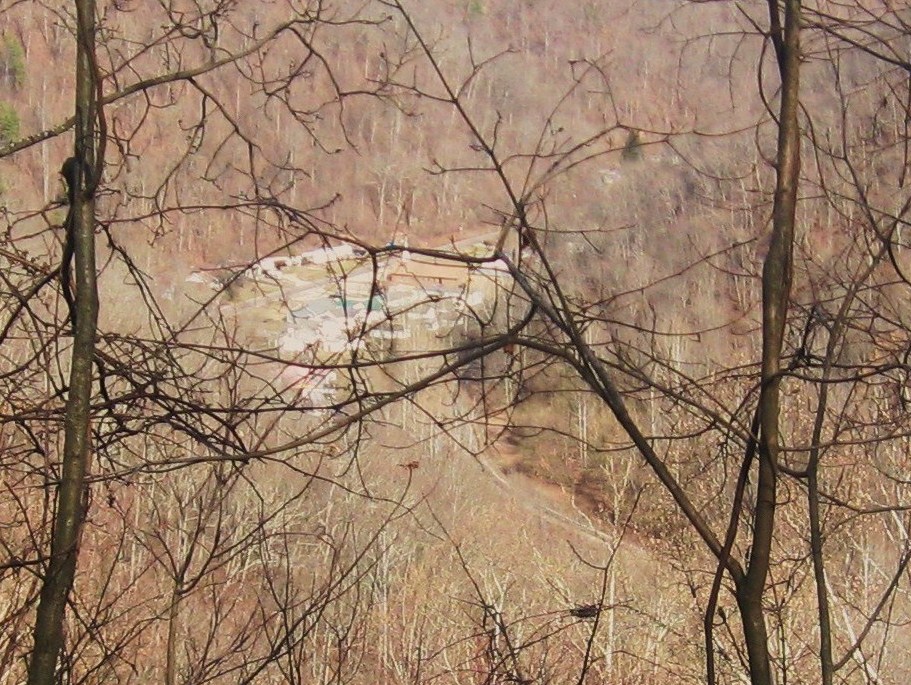
Thursday, January 22, 2009
WV Trout Fishing Pics
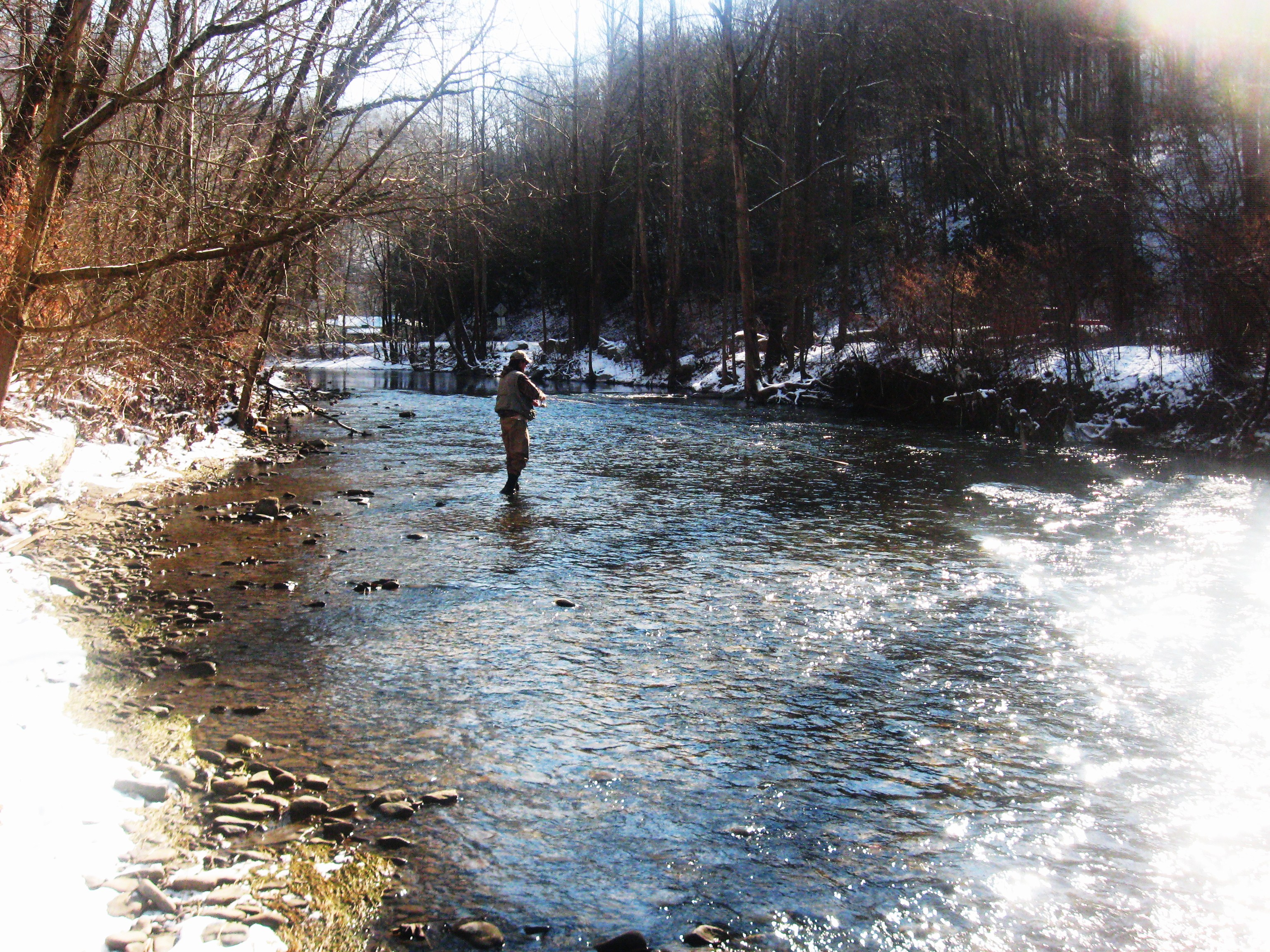
Brother Danny Cooper, a deacon in my church, took me trout fishing today. From what I understand this is a rare privilege. Danny is a fisherman's fisherman and keeps his secrets. Today, he showed me some great places to fish, however, and I was very grateful.
We saw many trout today, but it was just too cold to get them to bite. The stunning beauty of the hills of West Virginia made it all worthwhile regardless.

Wednesday, January 21, 2009
WV Pickin' and Grinnin'
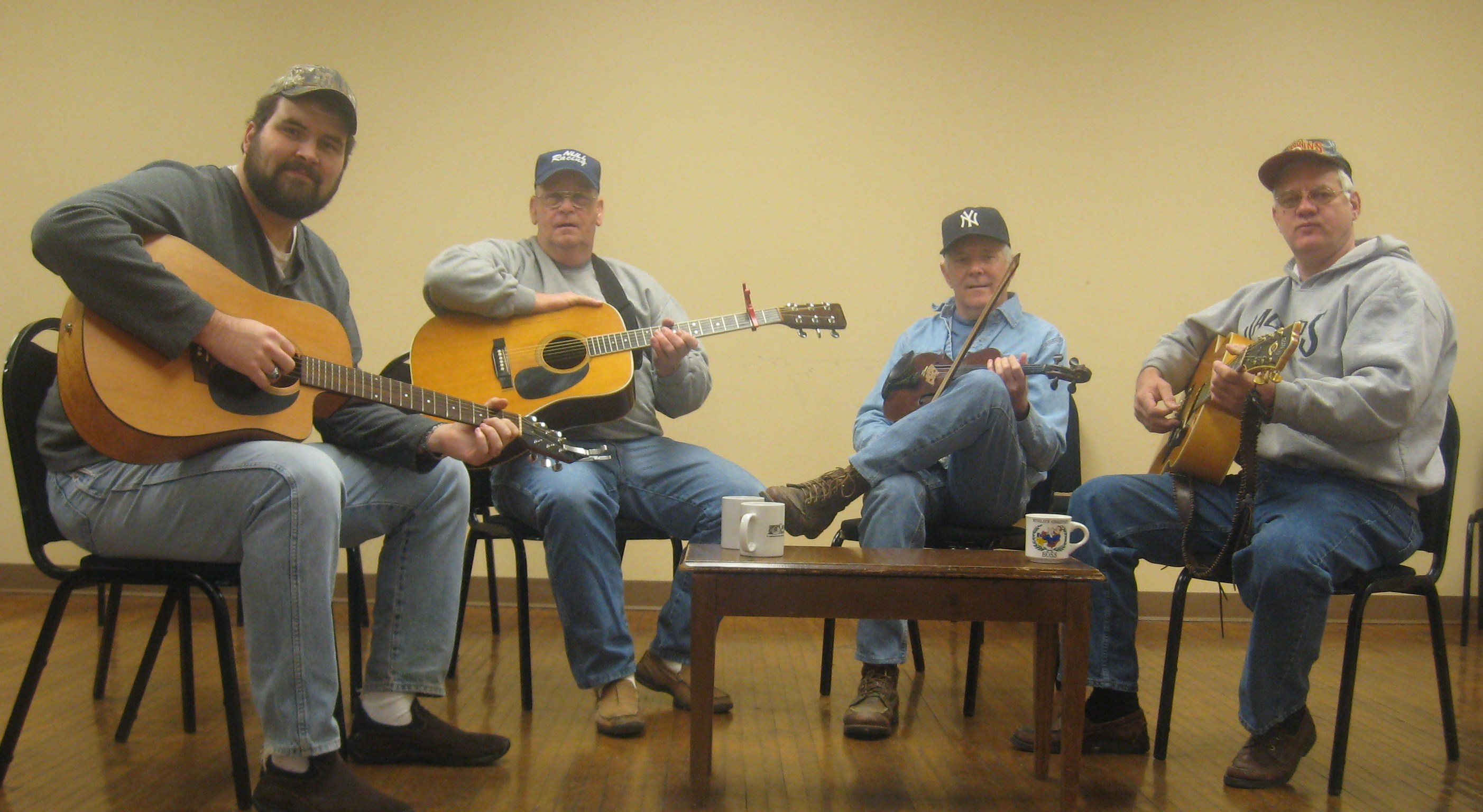 On Wednesdays, folks from the community come together at the town hall to play music for the senior citizens' luncheon. Usually there are two or three times as many people playing instruments like fiddle, base, mandolin, dobro, banjo, harmonica, and, of course, plenty of guitars. However, the snow kept them all away today, making for a smaller crowd that fits a little better into a picture.
On Wednesdays, folks from the community come together at the town hall to play music for the senior citizens' luncheon. Usually there are two or three times as many people playing instruments like fiddle, base, mandolin, dobro, banjo, harmonica, and, of course, plenty of guitars. However, the snow kept them all away today, making for a smaller crowd that fits a little better into a picture. My dad taught me how to play when I was young, although I have nowhere near his level of skill. That is mainly because I did not start practicing with any regularity until I was an adult, whereas he has practiced every day for many years. Below is a pic of my dad (center), playing in the group he started called the Four Pole Creek Old Time String Band. Dad plays fiddle, guitar, mandolin, and claw hammer banjo.

Tuesday, January 20, 2009
A West Virginian on Obama
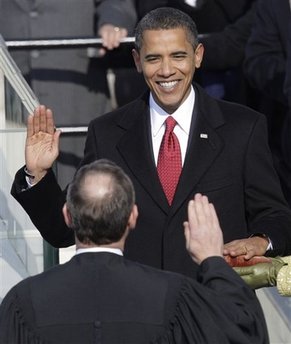 I have tried to stay neutral in the political race, mainly by keeping my political opinions relatively quiet. I pastor a wonderful church made up of both Democrats and Republicans, fine people who sincerely embrace Christ and his Word. My own political affiliation is independent. In West Virginia, that means that I am registered without a party affiliation. My allegiences are higher than either party for the sake of my congregation.
I have tried to stay neutral in the political race, mainly by keeping my political opinions relatively quiet. I pastor a wonderful church made up of both Democrats and Republicans, fine people who sincerely embrace Christ and his Word. My own political affiliation is independent. In West Virginia, that means that I am registered without a party affiliation. My allegiences are higher than either party for the sake of my congregation.
I am discouraged, however, to see some of my fellow WVians falling for the most elementary political fallacies. Several months ago, West Virginia made national news through "man on the street" interviews that made us look very bad. No doubt, the media picked the interviews that portrayed us in the poorest light. Here is an example of those sorts of interviews.
Today, I ran into one of those folks and heard it with my own ears, and I was amazed. She was not a member of my congregation. The topic of conversation was today's inauguration. Quickly, she asserted that Obama was a Muslim. I could not resist correcting her. "No he is not," I said. "He has publicly stated over and again that he believes himself to be a Christian." We have no valid reason to suspect that he is a Muslim, even if that mattered as a qualification for POTUS. Though I suspect his definition of "Christian" and mine are quite different, I run into supposed "Christians" every day whose definitions are very different from mine.
She continued "But he looks like a Muslim." I responded, "What does that mean? There are millions of blacks all across America. Does being black make one a Muslim?" I stopped short of telling her that such a statement was blatently racist. She finished with the assertion that "he does not salute the flag." Once again, I responded, "One picture has accidently captured Obama before he had a chance to salute during the pledge of allegience. Such an argument cannot be made from a single picture." The fact that she so quickly moved from one desparate reason to reject Obama to the next was revealing.
I think many are looking for excuses to not embrace Obama for reasons that hearken back to a darker time in our nation's history. This is shameful. West Virginia has once again demonstrated that many of us are behind the curve. There may be many legitimate reasons to prefer that someone else be president, but please, oh, please! Fellow West Virginians! Let them be good, accurate, well-reasoned, and unprejudiced!
Thursday, January 8, 2009
Deer Season Can't Come Soon Enough!
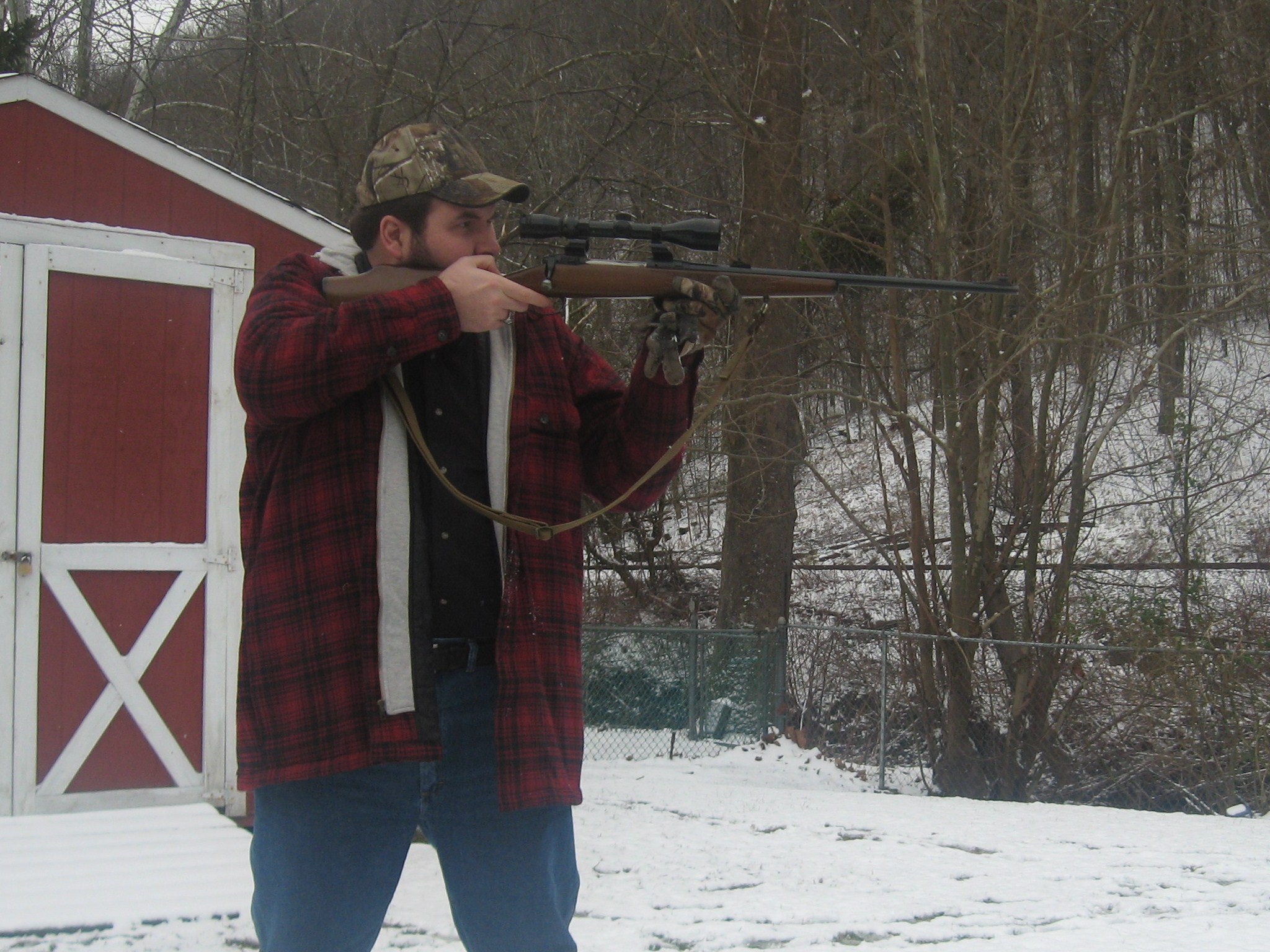
So I started the 2008 gun buck season using a Chinese SKS that a good friend of mine had given me. It was a fun gun, but I soon discovered that for deer hunting, it was just not accurate enough. Missed three deer at less than 40 yards. I knew it was the gun and not me when I borrowed a friend's .30-.30 and took two deer at the same distance with no problems. That meant I needed a real deer rifle.
I took the SKS down to the Trading Post in Marmet, WV and traded it for a Stevens (Savage) Model 110 .30-06 plus $50 to boot. I lost the gun my friend gave me, but got an excellent deer rifle for nearly nothing. Took it out this morning and zeroed it in. Took four shots to sight it dead center at 35 yards. Excellent gun. Kicks like a mule. Only eleven more months to go til the next deer season. Maybe by then I will have run out of deer jerky.
The Bills Blog at www.adoniram.net
Tuesday, December 30, 2008
A Grouse, A Squirrel, and a Four-Wheeler
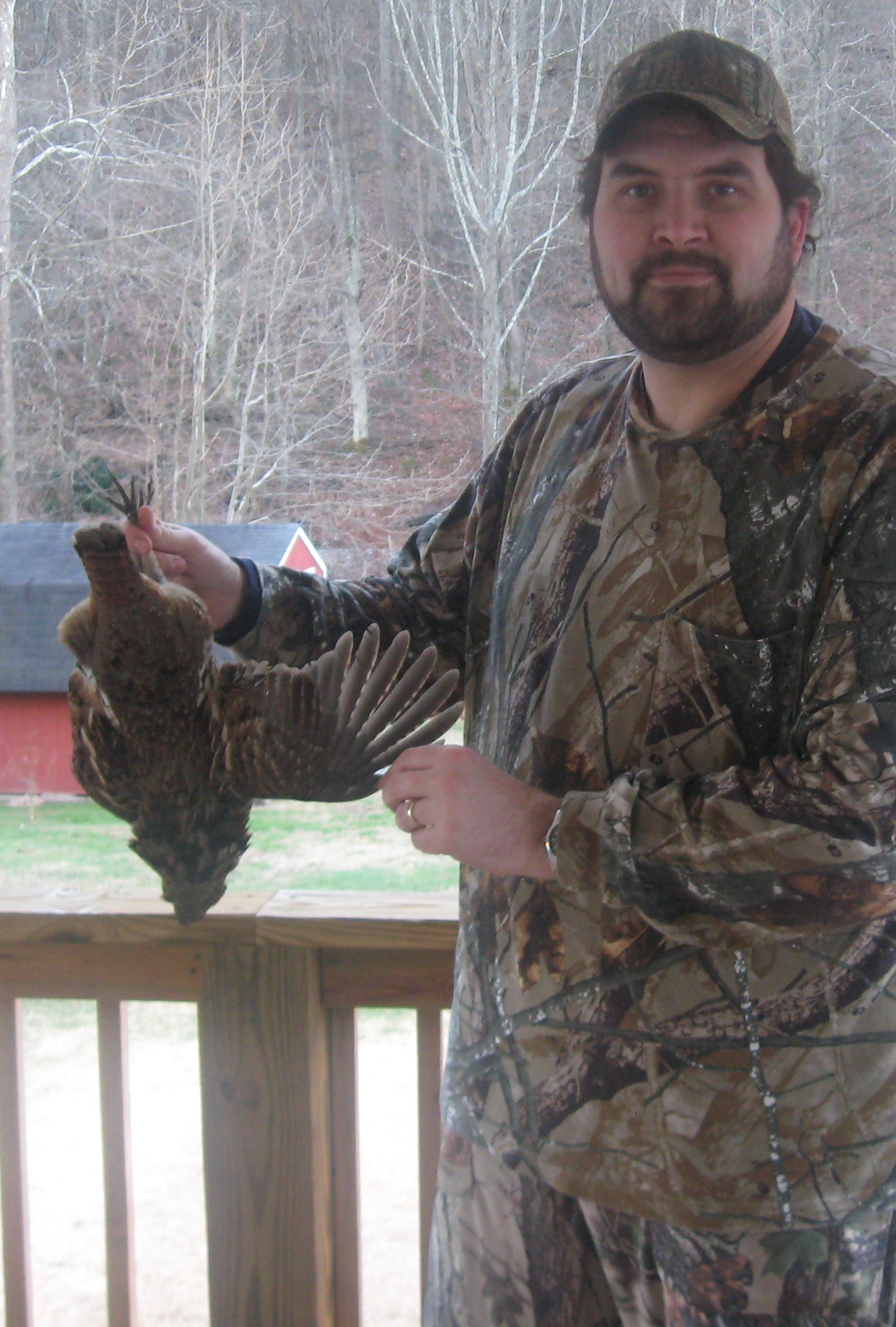
Tuesday began with some squirrel hunting with a fellow PCA pastor, Jason Driggers. Saw several, but didn't hit anything . . . something must be wrong with my .22. But once I returned home, a friend in Winifrede took me out ATV four- wheeling--25 miles of deep-woods trails, mud, logs, rocks, sticks, briars, and, along the way, one poor little grouse. Unfortunately for the grouse, I had a shotgun with me. He is now resting quietly in my freezer beside the deer. Now if I could only get some squirrel, my hunting conquest would be complete.
Sunday, December 28, 2008
WV Roots . . . The House Mom Was Raised In.
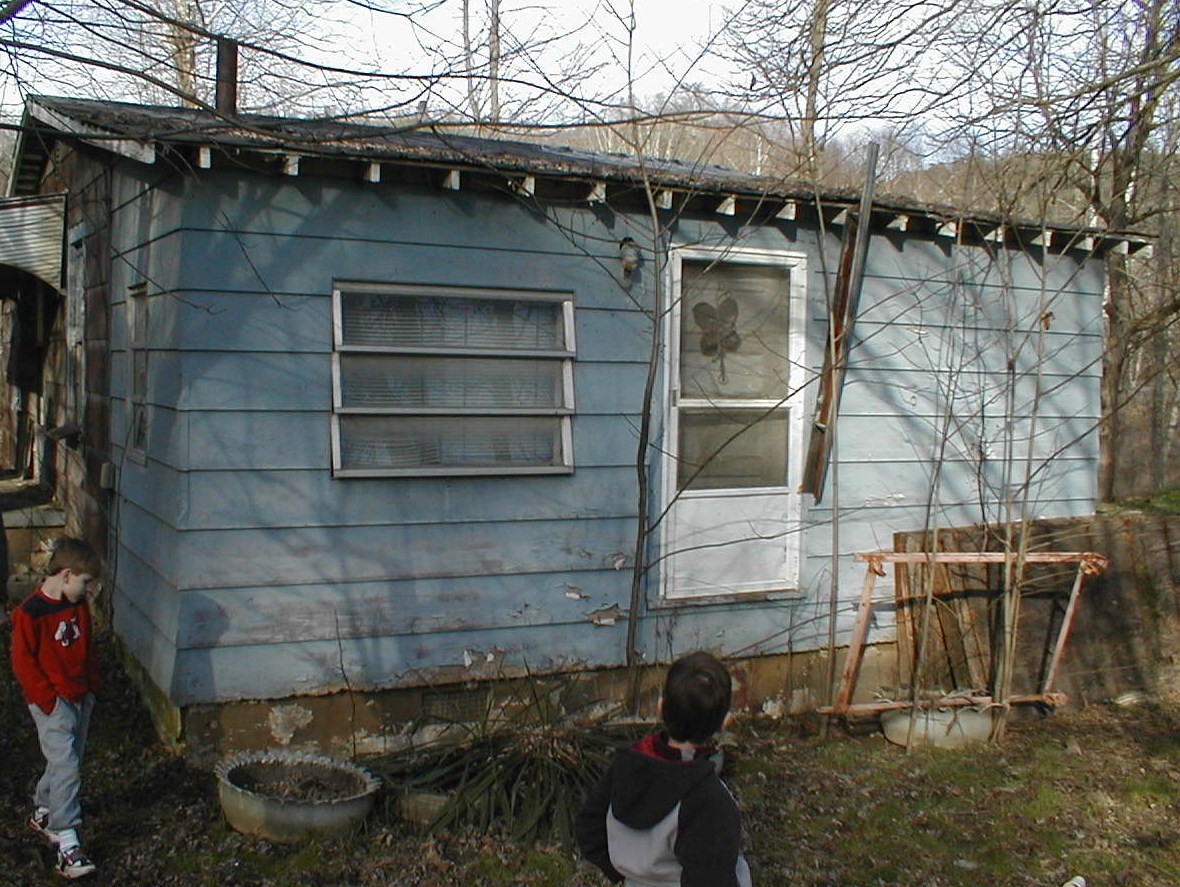
Located in the community of Branchland in Lincoln County WV, my mother and her four sisters were raised in this home. My grandparents finally moved out in the early seventies. I lived there myself for the first few months of my life. The house has fallen into disrepair in the decades since and is now uninhabitable. Probably should be torn down. But from what I understand, Mamaw and Papaw Bear had this little home looking quite pristine and beautiful beside the bottom by the Gyuandotte River. Two small bedrooms, a living room, kitchen, bathroom and a little den, all fitting within a few hundred square feet. Below are some pics of the interior as it appears today.
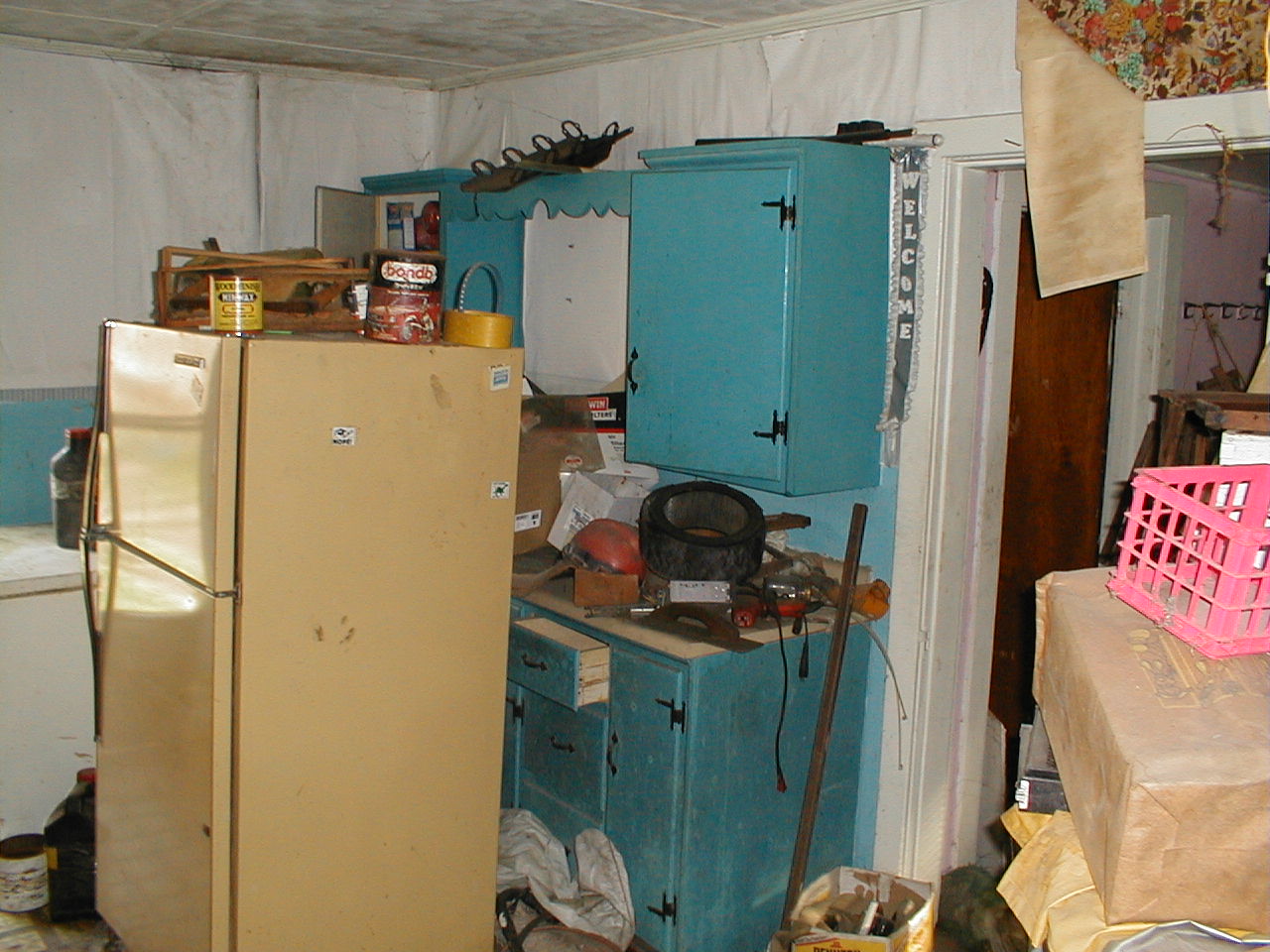
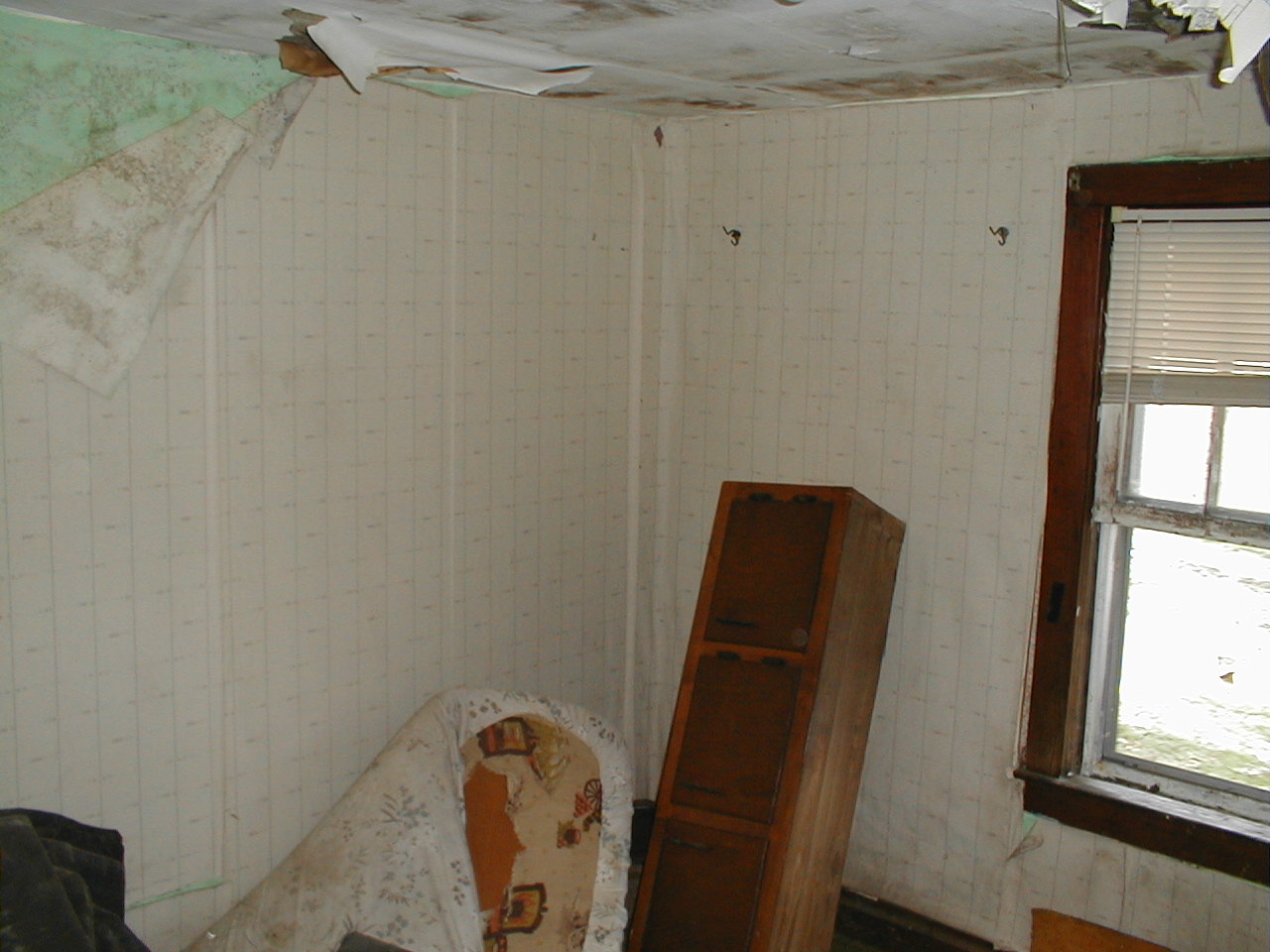
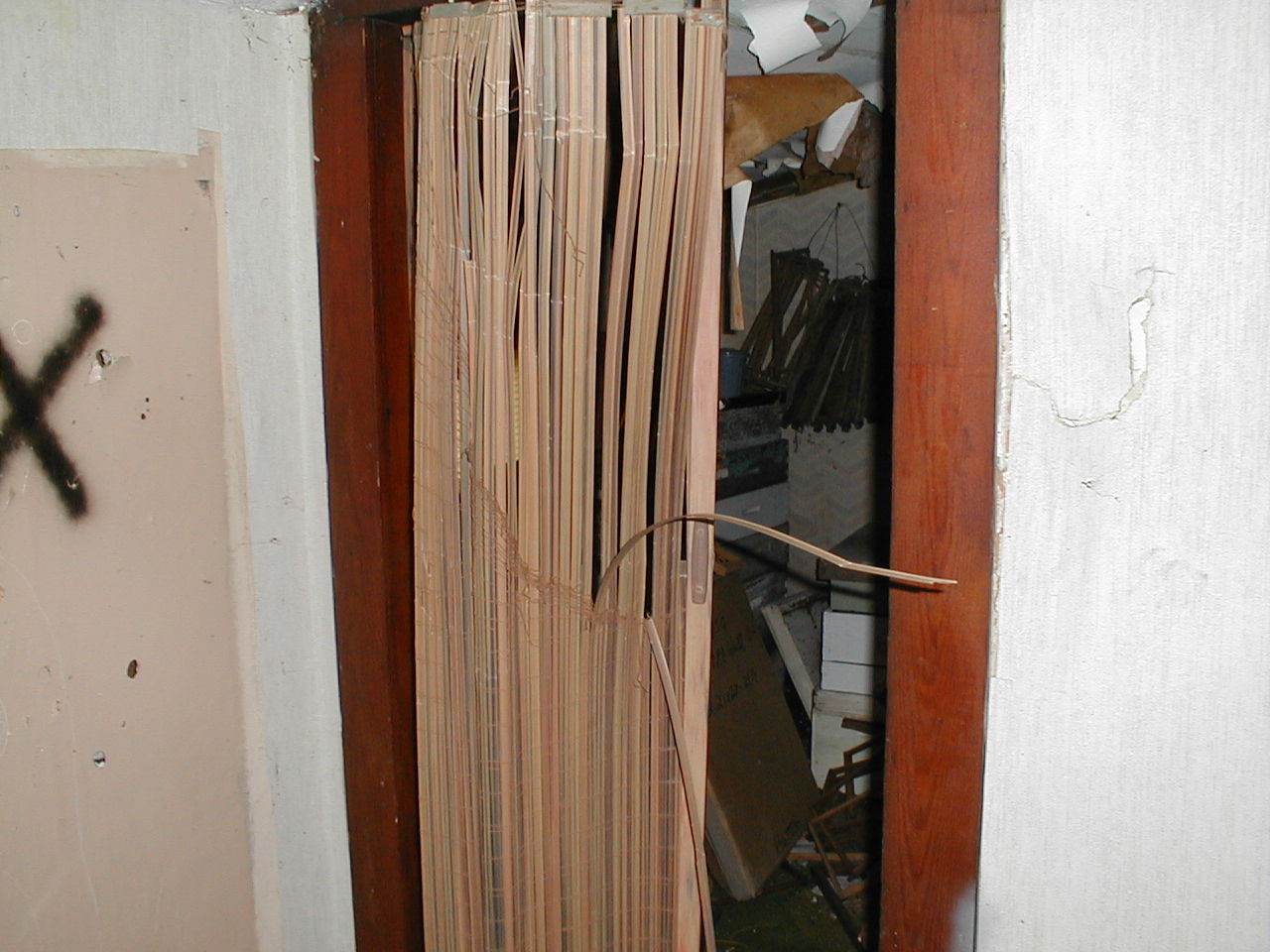
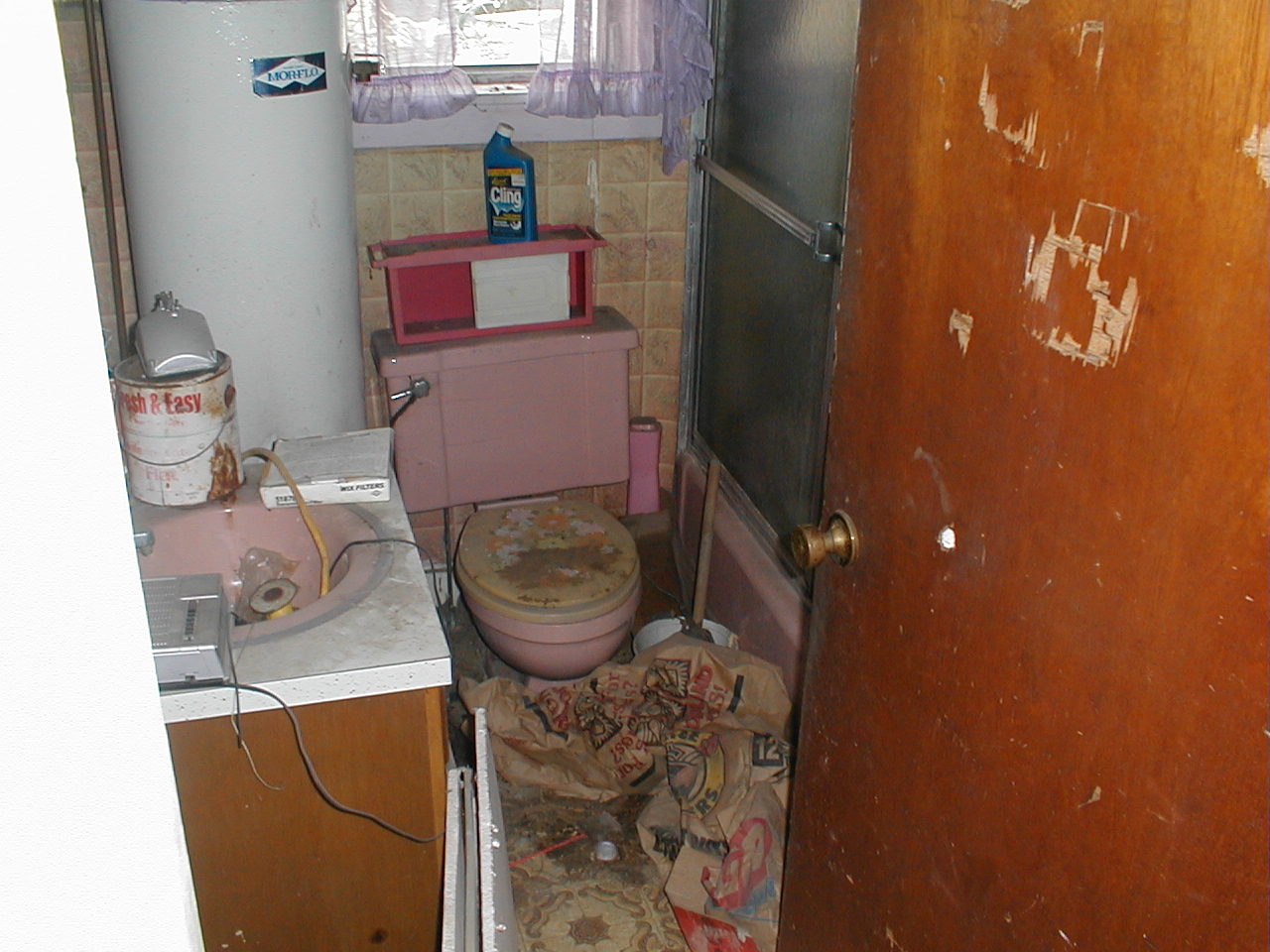
Sunday, December 14, 2008
Bills's Go Way Back in WV
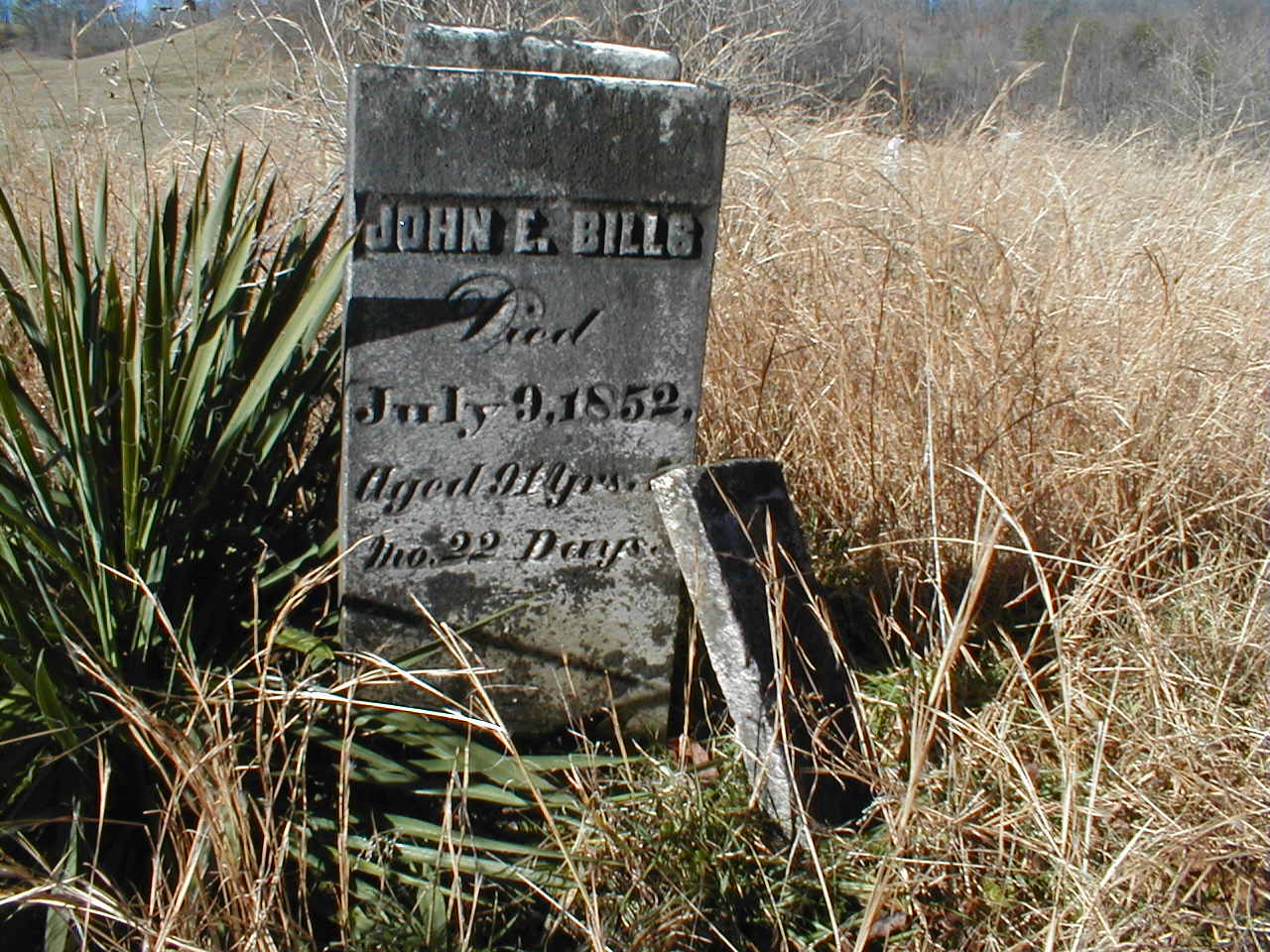
The gravestone of my great-great-great-great-great grandfather, located in Pleasants County WV. John Enoch Bills was born in 1763 and died in 1852, aged 91 years. He was a revolutionary war veteran. We have also located the burial places of his grandson all the way down through my grandfather. We have not located the gravesites of his father and son. A more recent marker honoring his service to our country is at his feet.
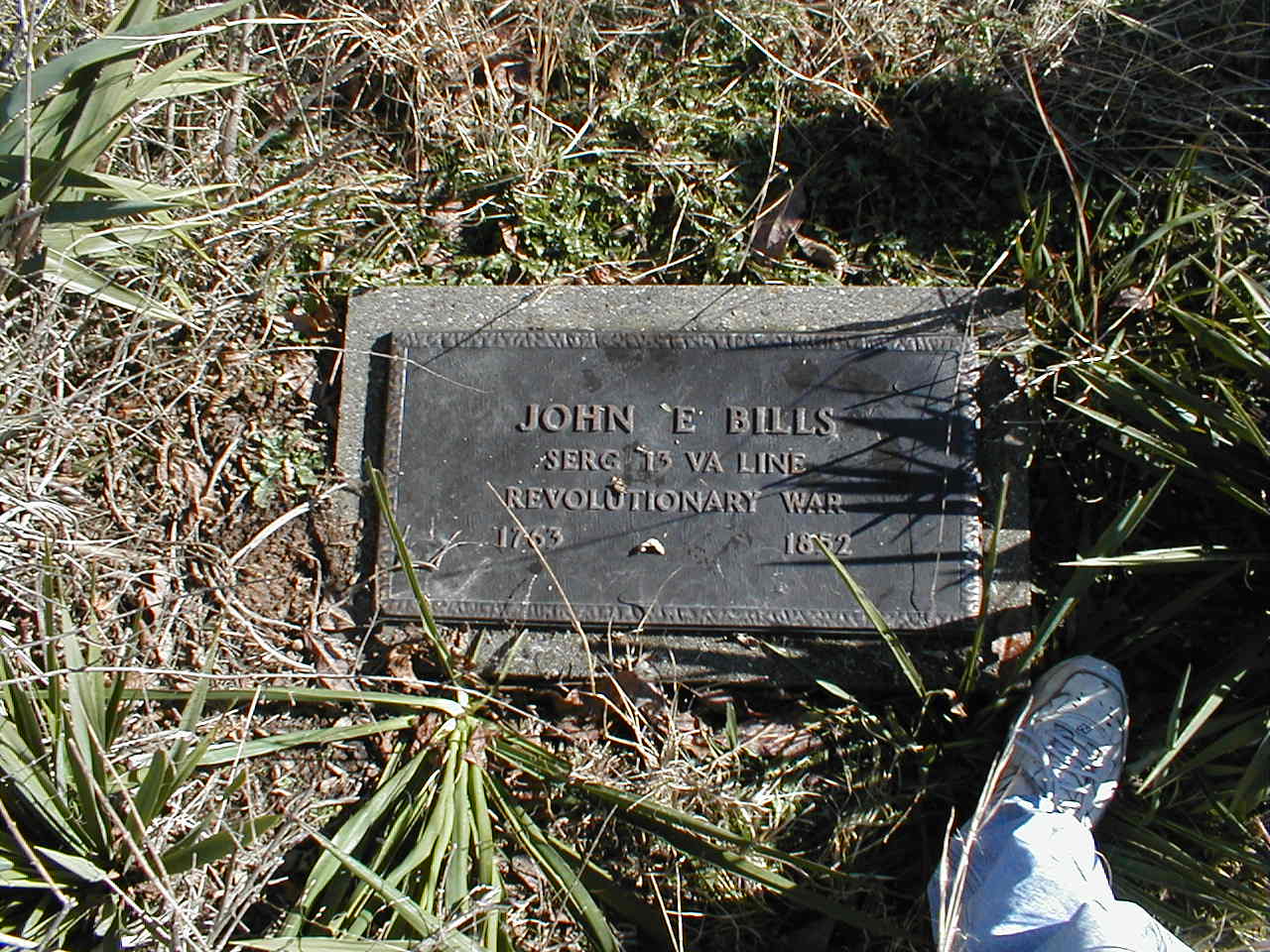
Friday, December 12, 2008
Winter in Winifrede Hollow
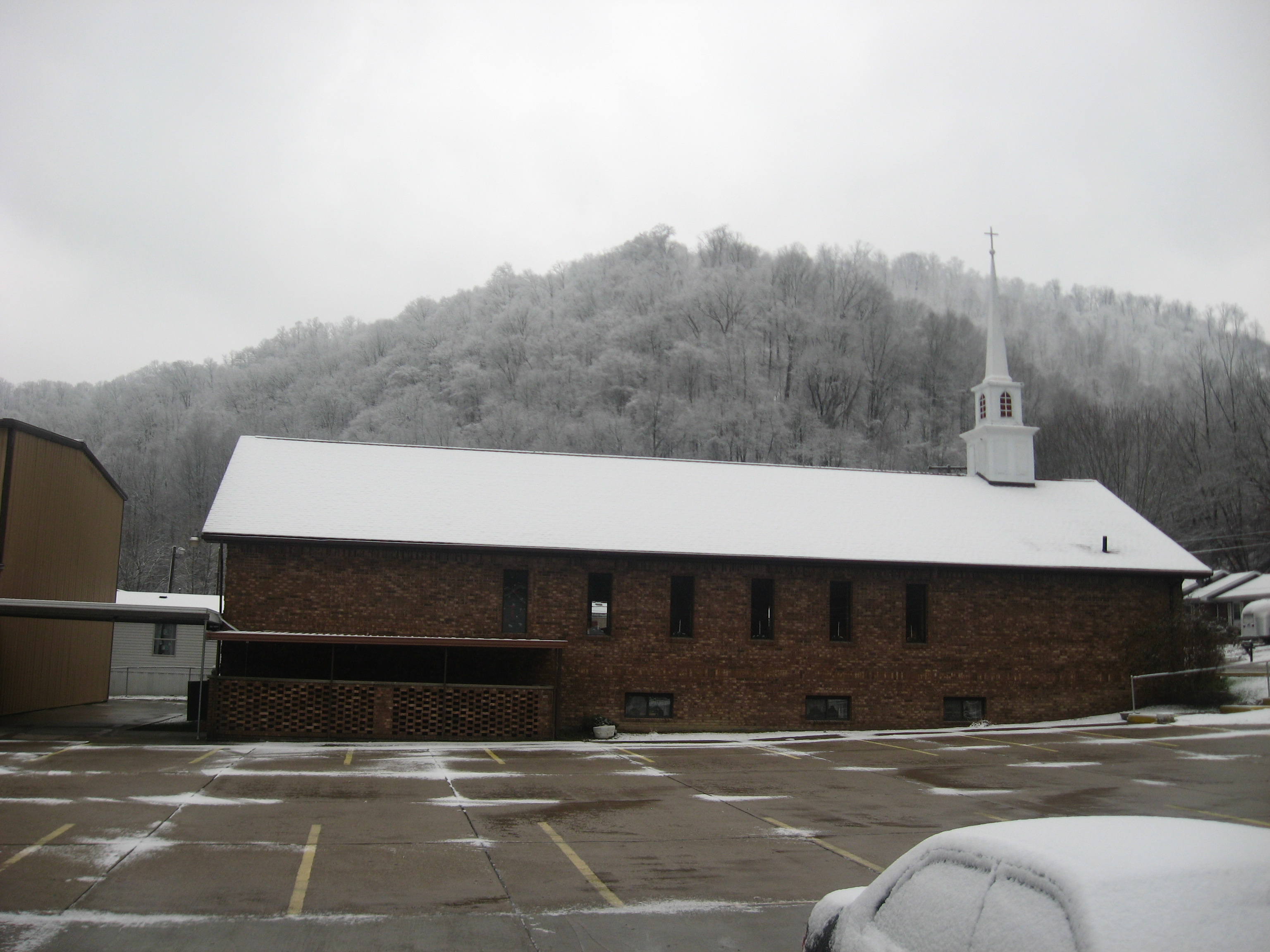
A light snow fell this morning, less than an inch. Its simple beauty makes us look forward to a real snow that covers it all. Even with such a light coating, the hills were beautiful. Really, this pic does not do justice to just how magnificent are the trees on the hillsides surrounding the church.
Saturday, December 6, 2008
My First Deer
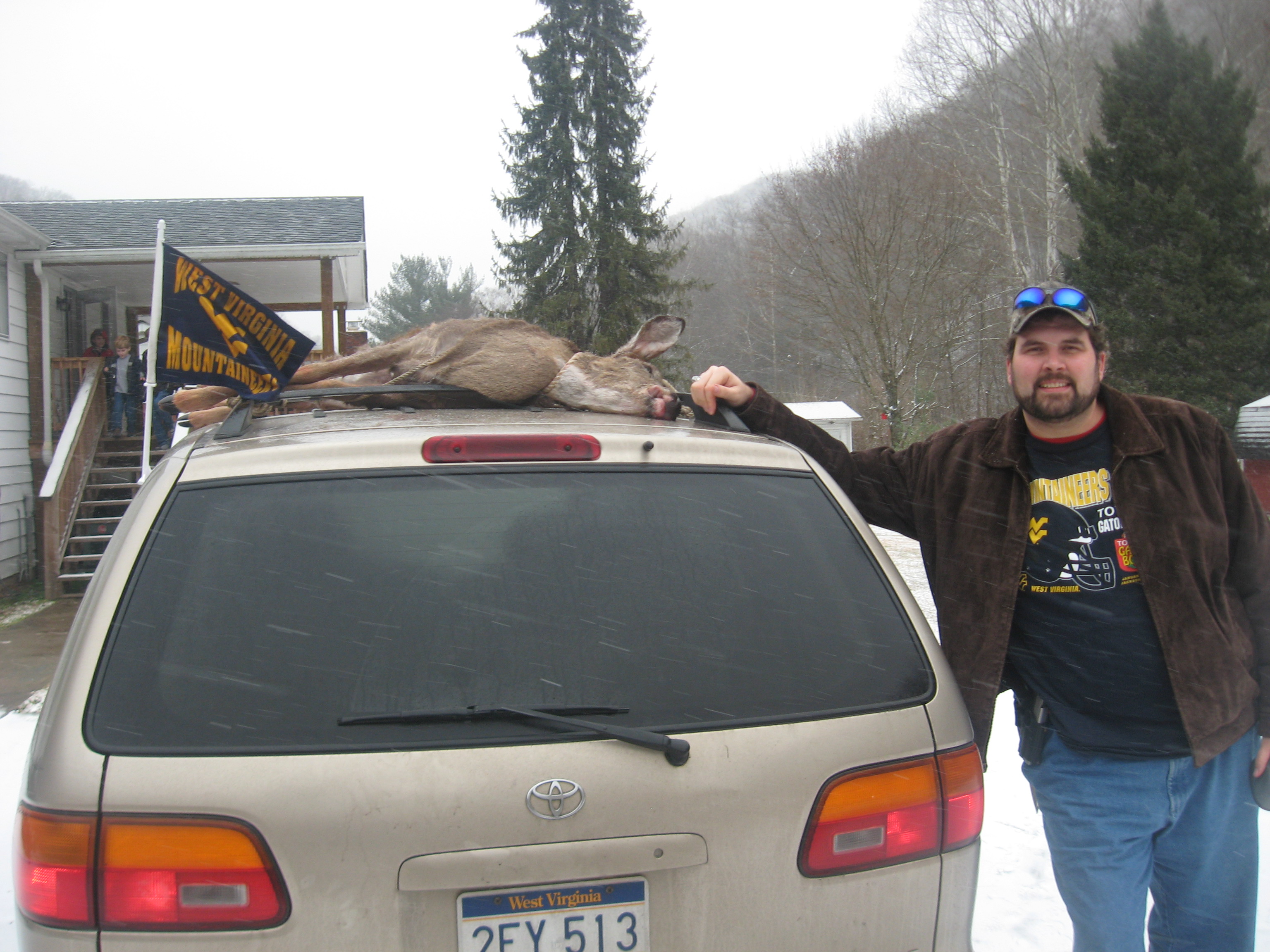
Finally, my first deer. Shot on my grandfather's property in Cabell County West Virginia.







